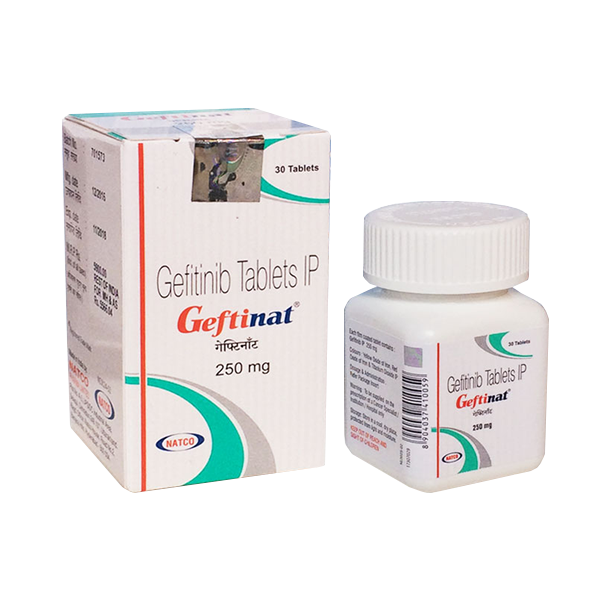Gefitinib is the main active pharmaceutical ingredient present in Geftinat. Gefitinib belongs to a group of medicines called as an anti- cancer drugs. It is a tyrosine kinase inhibitor chemotherapy medicine used to treat lung cancer.
Geftinat is a targeted therapy used for the treatment of locally advanced or metastatic non-small cell lung cancer, after failure of both platinum-based and taxane-based chemotherapies. Gefitinib is an anti-cancer drug which belongs to the class, tyrosine kinase inhibitors. It works by preventing lung cancer cells from growing and multiplying. These medicines blocks the chemical messengers called tyrosine kinases, which send signals to cells to grow. This stops cancer cells from growing and spreading.
Do not take the Geftinat if you: are allergic to this active ingredient Gefitinib or any other ingredient of the medicine; are pregnant or planning to be pregnant in the near future; are a breastfeeding woman.
Tell your doctor if you: have any liver problems; have had strokes or heart attacks; have a history of depression; have a diabetes; ever had an allergic reaction to any medicine; have any vision problem; have breathing problems, lung disease other than lung cancer
The dosage depends upon your weight, age, your medical history and your response to the treatment. Therefore, the correct dose will be decided by your doctor. Take the dose exactly as prescribed by the doctor. Never take two tablets at one time to double the dose.
Geftinat is to be taken daily with food or without food as prescribed by your doctor. The tablet is to be swallowed with a glass of water. Take Geftinat exactly as your doctor prescribed to you. Do not break or chew the tablet. You should take the dose until you complete the prescription. Do not stop taking the dose even if you feel better and cured. You should complete the prescribed dose. In case of an overdose, call your doctor right away, or get emergency medical attention. If you miss a dose of Geftinat, then take it as soon as you remember. Never take the missed dose if the next dose time is near. Taking multiple doses at the same time can lead to excess medication in your body which can be poisonous and dangerous.
Side effects of the drug: vomiting, dizziness, headache, constipation, nausea, diarrhea, and rash are the common side effects of Gefitinib. If any of these effects continuing for a long time or the condition become uncontrolled, contact your doctor immediately.
Geftinat may rarely cause serious side effects such as:blurred vision, chest pain, new or worsening cough with fever, tiredness, loss of appetite, upper stomach pain, bloody stools, dark urine, jaundice, severe skin reactions.
You must let your doctor know about your medical history in advance and always take the list of all medications with you, which you may be using, especially these ones: carbamazepine, diltiazem, erythromycin, fluvoxamine, rifampin, indinavir, ritonavir, amiodarone, and clarithromycin. However, this is not a complete information as mentioning all the details for this drug is quite difficult. There may be other medications that may show interaction. Never start a new medication with consulting a doctor






